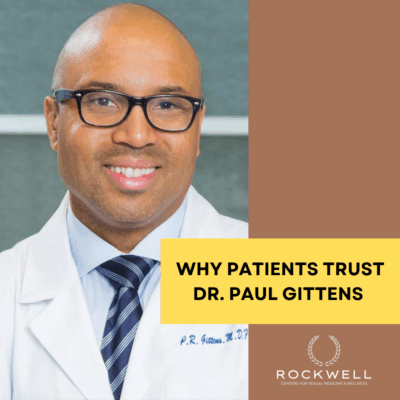Introduction
At Rockwell Centers, we specialize in hormonal treatment for women navigating menopause. This life stage marks a significant hormonal shift, often accompanied by symptoms such as hot flashes, mood swings, vaginal dryness, and osteoporosis. Hormone therapy (HT), including estrogen and testosterone treatments, has long been used to alleviate these symptoms. However, misinformation—particularly regarding the risks of HT—has caused unnecessary fear and hesitation among women and healthcare providers.
In this blog, we’ll explore the latest literature on hormone therapy for menopausal women, address the misinterpretation of the Women’s Health Initiative (WHI) study, analyze statistical errors that contributed to widespread concern, and examine the pros and cons of testosterone therapy for women.
Understanding Hormone Therapy for Menopause: Risks and Benefits of Estrogen Therapy
Hormone therapy for menopause typically involves estrogen alone or in combination with progesterone. The primary benefits of HT include:
- Reduction in Vasomotor Symptoms: Estrogen significantly reduces hot flashes and night sweats.
- Bone Health Protection: HT helps prevent osteoporosis and reduces fracture risk.
- Cardiovascular Benefits: When initiated in younger women (before age 60 or within 10 years of menopause), estrogen may lower the risk of heart disease.
- Cognitive and Mood Benefits: Some studies suggest that early estrogen use may reduce dementia risk and improve mood.
Despite these benefits, the fear surrounding hormone therapy has persisted for over two decades, largely due to the misinterpretation of the Women’s Health Initiative (WHI) study.
The WHI Study: How Misinterpretation Led to Fear
Does hormone therapy increase the risk of breast cancer, stroke, and heart disease?
The 2002 Women’s Health Initiative (WHI) study initially reported that hormone therapy increased the risk of breast cancer, heart disease, stroke, and blood clots. This prompted a dramatic decline in hormone therapy prescriptions. However, subsequent reanalysis of the WHI data revealed the following:
- The increased risks were primarily observed in older postmenopausal women (over 60 years old or more than 10 years past menopause) rather than those in the early stages of menopause.
- In younger women, hormone therapy reduced overall mortality and cardiovascular disease risk when used appropriately.
- The absolute increase in breast cancer risk was small (less than one additional case per 1,000 women per year).
- Estrogen alone (without progestin) did not increase breast cancer risk and may even reduce it.
- The rate of colon cancer was decreased in women using hormone therapy.
The Problem with Statistical Analysis in the WHI Study
A major flaw in the WHI study was the way it presented relative risk versus absolute risk (the risk in real-world terms). The study reported a 26% increased risk of breast cancer with combined hormone therapy. However, this translated to an absolute increase of only 8 additional cases per 10,000 women per year—essentially minimal. Similarly, the reported 29% increased risk of heart attack was primarily significant in older women, while younger women had a reduced risk.
Misinterpretation of these statistics fueled unnecessary fear, leading many women to suffer from untreated menopausal symptoms.
Testosterone Therapy in Women: Pros and Cons
While estrogen and progesterone dominate discussions on menopause, testosterone therapy is gaining attention for its role in sexual health, energy levels, and muscle maintenance in women.
Pros of Testosterone Therapy for Women
- Increased Libido: Testosterone can improve sexual desire, arousal, and satisfaction.
- Enhanced Mood and Energy: Some studies suggest that testosterone can help with fatigue and depression.
- Muscle and Bone Health: Testosterone contributes to muscle maintenance and bone density.
Cons of Testosterone Therapy for Women
- Acne and Oily Skin: Higher testosterone levels can trigger breakouts.
- Hair Growth or Loss: Some women may experience increased facial hair or thinning of scalp hair.
- Voice Deepening & Clitoral Enlargement: These side effects are rare but may be irreversible.
We’ll delve deeper into testosterone use in a future blog.
Conclusion: A Balanced Perspective on Hormonal Therapy
Hormone therapy for menopausal women remains a safe and effective treatment when used appropriately. The fears stemming from the WHI study were largely based on misinterpretation of statistical data, which led many women to avoid a treatment that could significantly improve their quality of life.
Testosterone therapy offers additional benefits for sexual health, energy, and muscle maintenance in women, though it carries risks such as acne and hair changes.
Final Takeaway
Women considering hormone therapy—whether for menopause or perimenopause—should have personalized consultations with a healthcare expert. At Rockwell Centers for Sexual Medicine and Wellness, our providers weigh the benefits and risks based on age, medical history, and individual goals, offering hormone therapy at the highest level.
By understanding the latest research and dispelling myths, women can make informed decisions about their health and well-being, and we’re here to help you achieve your goals.
Visit us at RockwellCenters.com
Offices in:
- Philadelphia, PA
- Manhattan, NY
- Allentown, PA













